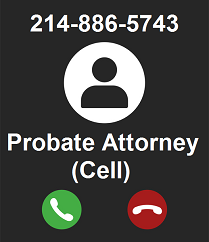Probate: 469.708.6050
Wills & Guardianship: 214.227.6400
13355 Noel Rd., Ste. 1100
Dallas, Texas 75240
Collect Tangible Personal Property
It's amazing to see how many disputes occur over the decedent's "stuff". As the executor, your ability to quickly take control of such property may determine the overall path of your probate.
Take Photos
Upon notification of the decedent's death or sickness, the executor should make a beeline to the decedent's home and photograph all of the rooms of the decedent's house. This will prevent family members, friends or caregivers from alleging that the decedent gave a particular item to the family member prior to the decedent's death. For valuable items such as jewelry, take close-up photos.
Set aside the furniture for the Surviving Spouse
The furniture and furnishings of a home are exempt property under Texas law, and therefore are not subject to creditors' claims. The decedent's surviving spouse and minor children have the right to use the furniture and furnishings of the estate during the administration of the estate. This is true even if the property was the decedent's separate property and is given to another person under the terms of the Will. Please contact us if you have a contentious situation regarding the use of the furniture and furnishings.
Remove Property from the House?
Some executors named in the Will often ask if they should remove valuable property from the decedent's home. That's a tough question to answer. Vacant houses in the Dallas, Texas area are often burglarized. Thus, removing property from a vacant home may be a good move. If you remove the property from the home, however, it would no longer be covered by the decedent's homeowner's insurance. If the property is in your home and a theft or fire occurs, then the property may not be covered by your policy either. Therefore, removing the property comes with some risk too. Thus, I recommend that jewelry be removed from the home and immediately placed into a safe deposit box. For other expensive personal property, it is up to you. Keep in mind that most household property depreciates rapidly the minute it is sold.
Hold an Estate Sale?
Some executors named in the Will often ask if and when they can have an estate sale. The Texas Estates Code states that the title to the decedent's property immediately vests in the heirs of the estate subject to creditors' claims. This would suggest that if there are no creditors' claims, the beneficiaries of the property could have an estate sale the day after the decedent dies. Contrarily, the Estates Code states that the executor has the exclusive right to control the property of the estate during the course of the administration of the estate. A named in the Will is not the executor of the estate, however, until the Court appoints the person as executor. This would suggest that if there are creditors' claims, the person named in the Will should seek the Will's admission into probate before holding an estate sale.
© 2016-2021 Duran Firm, PLLC
All rights reserved.













